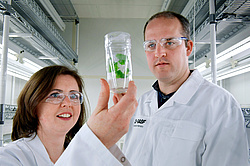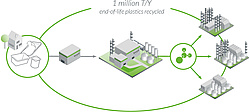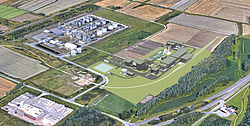Partnerships
We can only keep the planet habitable if we change our way of life. This has consequences for every phase in the production and consumption process. Governments, manufacturers, research institutions and citizens are all working on the transition to a circular economy. Indaver enters into partnerships with all of them.
Sustainable partnerships with customers
Sustainable, strategic partnerships with our customers produce the best results. Through close collaboration and knowledge sharing, we can continually improve our activities and theirs. This collaboration contributes to the success of our Total Waste Management projects and our Public waste Partnerships.

“Our waste streams are characterised by their complexity and diversity. That means we need a partner who has the expertise to support us with advice and solutions. We want to concentrate on our own core business, and need someone who can take care of everything for us while guaranteeing that we are fully compliant with all legal requirements. Our partnership with Indaver is characterised by a mutual open mindset. Everything is open for discussion and we can see that comprehensive records are kept. There is a clear desire to search for solutions, even in demanding situations. That gives us confidence.”
Jeroen Auwaerts, Environmental Coordinator, and Delphine Beeckman, Biosafety Manager EMEA, colleagues at BASF AgriCultural Solutions.
- Read the full story
- Watch the video with Jeroen from BASF
- Watch the video with Delphine from BASF
Knowledge Consortia
We are continually looking for ways to test and enrich the knowledge in our organisation and to gain new expertise. We work closely with universities and research institutions to set up and conduct innovative projects. Together we turn promising ideas into a practicable and feasible project.

Plastics2chemicals: test facility fully under development
Working alongside Flemish universities, Indaver has been looking for a solution for hard-to-recycle plastic streams for a long time. Together with Ghent University, they have worked out an innovative process on a laboratory scale: plastics2chemicals. Plastics are broken down into smaller hydrocarbon chains. This produces a pure end product for the chemical industry. Indaver now wants to improve this solution on an industrial scale. For this, it is building a testing facility for 15,000 tonnes per year at its site in Antwerp. The licensing application is underway. In this facility, we will test the depolymerisation process in practice. In total, Indaver is planning ten facilities in Europe through which we will eventually be able to recycle 1 million tonnes of plastics.
Sharing knowledge
If we are to give the circular economy a chance, we can't continue to sit on information. We make our own knowledge and expertise available to other stakeholders in the circular economy: companies, sector organisations, governments, schools, citizens. We give presentations at conferences and events, and we set up stands at trade fairs both at home and abroad.
Partners in business
We are working with other companies to realise the projects needed for the circular economy. That way we can share our professional knowledge and networks. Other companies offer new perspectives and help to resolve developmental sticking points. We also encourage industrial symbiosis, in which we recover raw materials from one company’s waste for use in another company’s manufacturing processes.

IndaChlor: sustainable solution for chlorine residues
In 2018, Indaver received the necessary licences for a new treatment facility in Loon-Plage, in the Port of Dunkirk, in France. This new facility has a 40,000 tonne capacity and will recycle chlorinated residues from the PVC industry to recover hydrochloric acid and energy. Hydrochloric acid is used in the chemical, petrochemical, metallurgy and food industries. We will supply recovered energy through a steam pipe to a neighbouring alcohol distillery.
Good neighbours
We maintain open communication and good relationships with the people who live near our facilities. We use neighbourhood councils and consultation committees to keep them informed of our activities, projects and permit applications or renewals and we make time for their questions. We let our neighbours take a peek behind the scenes on open days and company visits. We open our doors to foreign visitors who want new ideas for sustainable waste management in their own country. We share our good practices on trade missions abroad.
